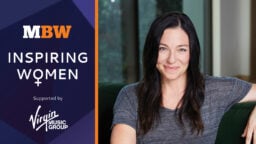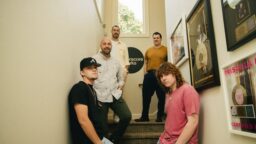MBW’s Inspiring Women series profiles female executives who have risen through the ranks of the business, highlighting their career journey – from their professional breakthrough to the senior responsibilities they now fulfil. Inspiring Women is supported by Ingrooves.
Martha Earls has defied the odds with Kane Brown — a tattooed biracial country act who first found fame via social media.
He’s not the kind of artist who fits in with the traditional Nashville community, and, as Earls tells us, that resulted in doors at key gatekeepers remaining closed until his success couldn’t be ignored.
“When we released his first single to radio, which was already a gold record just based on Kane’s popularity on social media, I remember sitting in the office with a colleague of mine and we were like, ‘This is going to be the fastest hit that’s ever happened on radio,’” Earls remembers.
“And then it wasn’t. That was a pretty abrupt wake-up call. But it was a good thing because you can’t ever have too many expectations or assumptions about what’s going to happen.”
In the meantime, Earls focused efforts elsewhere, which was mainly through social media in the early days of Brown’s career.
Eventually, radio came around and Brown now has eight No.1 hits at country radio. His success also spans three Top 5 albums on the Billboard 200 and country chart, three AMA Awards, and over 4 million ticket sales.
Earls adds: “Kane went out there and demonstrated his fan connection.
“Kane broke down preconceived notions of what a country artist looks like.”
“[Radio programmers] met him, he broke down their preconceived notions of what a country artist looks like, and I think that really opened up the door for a lot of people.”
Earls met Brown early on in her management career, which started eleven years ago by helping to look after artist, Greg Bates.
That followed a decade in music publishing, during which time Earls held roles at Warner Chappell Music and BMG, before starting her own ventures.
With the first company, Earls’ writers had cuts with Blake Shelton, Rodney Atkins and Rascal Flatts with Natasha Bedingfield before the company was sold back to its investor.
Her second, which was sold to Big Machine (where she spent some time during the transition process), kickstarted Earls’ foray into management, and working with Bates made her realize that’s where she was happiest.
She explains: “It’s really hard to start a publishing company from ground zero and build it — you’re really just sitting around and waiting for your songwriters to write a hit and nurture them in that process.
“For me, I’m so results-oriented and action-oriented and I’m an opportunist in the best sense of the word. So it wasn’t the pace that I like to operate at.”
Today, Earls heads up music company, Neon Coast, which has a management division, production company and a joint label venture with Sony Music Nashville and Sony Music Publishing.
Alongside Brown, management clients include country acts Restless Road and Dylan Schneider, and pop band Nightly. Earls tells us that she’s looking to grow the roster with a female artist and is focusing on company expansion.
Here, we chat to her about her approach to management, lessons learned across her career, and how being a parent influences what she does.
How has your background in publishing shaped your approach to management?
Being respectful to the creative process and understanding the value of the artist as a person and the songs as art. Sometimes, when you’re a few steps down the chain, people tend to see the artist as a commodity and don’t understand that there’s a person behind what they are selling. Also, you can have all the other elements that you think will work, but without great music, you’re wasting your time.
“when you’re a few steps down the chain, people tend to see the artist as a commodity.”
To have that foundation on the creative side is the most beneficial thing to me. I have no regrets for how much time I spent in music publishing because it was such a tremendous education for respect for the process and respect for the creatives. Some people don’t have that experience.
you were at Big Machine when Taylor Swift was releasing Red. What did you learn about artist development during that time?
Scott Borchetta didn’t put any boundaries on what he was doing. That became ingrained in me. Taylor Swift, to me, is the ultimate example of an artist who can start as one thing and blossom into the full representation of themselves as an artist, without any boundary, and continue to persist while there’s naysayers. Anytime you’re that artist who’s a bit disruptive, it makes people uncomfortable, and they start dissenting.
Seeing Big Machine stay so mission-focused while releasing that project, knowing innately how successful it was going to be and not allowing themselves to be deterred by people that couldn’t keep up pace or were uncomfortable because they were doing something different, was so inspiring to me.
What are the other attributes that make a good manager?
The personal attribute that I can speak of is to be big-picture thinking, while also understanding the steps that need to be taken to get to the end goal. You can be at 30,000 feet and have this big end goal, but if you can’t jump from step one to step 10, you have to take all the steps in between. So it’s about being thoughtful about a plan and then every time we have success, seeing that as an opportunity to build, rather than a destination.
I always love an actionable step. If I get off a call or come out of a meeting and there’s no actionable step to take, I feel like it was a waste of time. It’s the same helping artists with their careers — if we have something great that happens, let’s take action and do something more.
Do you have any examples of how you’ve done that?
Yes, Kane had a big hit with Marshmallow on a song called One Thing Right and instead of letting that be its own isolated moment, it was, ‘How do we grow his fan base outside the traditional country fan base?’ We started with Marshmello, so what’s the next opportunity to reach more people? With Kane, if we put him in front of people, they love him. So we just need to expose him as widely as possible. Then it was about finding the next Top 40 record, which in that case was Be Like That [with Swae Lee and Khalid].
Another example is that Kane has a strong presence in the sports world. The first thing we did was a commercial with the NFL and New Era. We built on that by him performing at the halftime of the Dallas Cowboys and now we have a strong relationship with the NFL.
One more example: right before the pandemic back in January of 2020, he played the Staples Centre, which is now the Crypto.com arena, in Los Angeles. He sold it out, it was tremendous. I was sitting with his promoter the night before the show and he said to me, ‘We should do more of these’, almost kind of joking. I was like, ‘No, we should do all of these’. And that was where the idea for the NBA arena tour came from. Kane is the first country artist to tour all 29 NBA arenas in a single tour, which he did last year. It was a massive success.
I read that you know you don’t have to do things in the traditional way. What does that mean in practice?
This has all been altered slightly with social media and the record label’s dependency on TikTok, which is a whole other conversation, but when Kane first started, there was this template for how you have a successful career. You have a hit on the radio and then you released your album. And maybe, on the highest of hopes, you have a song that’s a big enough record to be played on pop radio.
“Kane didn’t have immediate success at radio, because country radio programmers, five, six years ago, made preconceived notions about him based on his race.”
But with Kane, he didn’t have immediate success at radio, because country radio programmers, five, six years ago, made preconceived notions about him based on his race. So we had to adapt. We put his first album out and he had a No.47 song, falling off the chart. But we figured out non-traditional ways to reach fans.
Fast forward to today, no artist has done what he’s done. He’s had four hits on pop radio that were never played on country radio, he’s had eight No.1s on country, and they are completely different songs. No other artist that I know of has been able to navigate both of those worlds and have these almost dual careers. But I think it’s simply because everyone says you can’t do it. Hopefully we’re an example of how you can.
How did you reach those people without the traditional routes to market?
Yeah, and also with the backlash, because that’s part of it too. If you don’t do things the traditional way the industry tends to give you some backlash. Kane’s never been nominated for a CMA award for his own music. It’s crazy. He’s one of the biggest stars in the format and has never been nominated because he makes people uncomfortable, I guess.
That said, the way you do it is with great music and authenticity. With Kane, whether he’s doing a pop song, or a country song, he’s only doing music that is authentic to himself. And he knows himself probably better than any other artist I’ve ever met. There’s no wishy-washy, ‘Oh, maybe I could do this, maybe not’. He knows definitively who he is. I think that’s an important element.
“If you don’t do things the traditional way the industry tends to give you some backlash.”
And at the end of the day, he is a country singer, but he’s a cultural crossover. So it’s just reaching those people that he crosses over to. With him in the early days, it was through social media. He’s the first Nashville artist to really break through on social media and speak directly to his fans.
Like you alluded to, the route to breaking an artist has shifted now from radio to record labels spending marketing dollars on platforms like TikTok to create ‘viral’ tracks. What do you make of that approach?
It’s complicated. Social media, regardless of the platform, is incredible because it’s an equalizer and it allows the consumer, the fan, to choose what they like, rather than a record label saying, ‘Hey, this is the song we think that people need to hear and we’re going to release it to radio and determine whether you can hear something or not’. So it’s definitely democratised the process for reaching fans and also gives artists a direct connection to fans.
What happens, though, is whenever something starts working, and I hate to sound like I’m dogging the labels, but unfortunately it’s part of their business model to try and figure out how to manipulate it to their benefit. That’s where I think it starts to get a little foggy. Because all of a sudden, you have 20 people weighing in on what the artist should be saying on their social media to their fans. Doesn’t that defeat the whole point of what we’re trying to do?
Also, people are signing moments – 15 seconds of a song being popular — without a plan to develop a long-term career for the artist they’re signing. That’s troublesome to me because that implies these artists are disposable people. ‘Oh, you had a hit, we’ll sign you. You don’t have another one? Whatever, we’ve moved on.’ Are you really giving them everything they need to have the most successful career possible? I do have some concerns with that.
“people are signing moments – 15 seconds of a song being popular — without a plan to develop a long term career for that artist they’re signing. That’s troublesome to me.”
As you mentioned, you’ve been a parent the whole time you’ve been in management. How does that influence your work?
My two daughters make me better at my job because I am more compassionate and more patient with people. As soon as I had Avery, my eldest daughter, I started having to manage my time better and prioritise things better. I never realised how much time I wasted before or conversations that I had or things I put emotional energy into. I didn’t have time for that after I had my daughter and it made me much higher functioning. It’s fascinating how kids affect things, for better or for worse, and for me it’s definitely for better, whether it’s marriages, jobs, friendships or just your worldview.
It is. You hear a lot about the downsides of parenting before you become a parent but there’s also the positive side of it; how it offers so much opportunity for personal growth and prioritizing what’s really important.
Yes, and as cliché as it sounds, you’ll figure out what really matters. When people say that to you, it tends to be in a patronizing way like, ‘You’ll figure out that what matters to me will now matter to you’. But that’s not the case. All of a sudden, you gain a wild sense of self. There’s a power that comes from within you that you have this child and there’s a bond there that no one else on the planet, not even the father of the child, can understand. It’s very empowering. It’s funny in a way how societally, they’ve tried to turn motherhood into a weakness. And I think that’s because deep down, it’s a very powerful thing. Maybe the patriarchy is afraid of that.
What’s the best thing about working as a manager?
The best thing about being a manager for new artists is their success is truly your success. Watching, with new artists especially, a lifelong dream come true and being a part of that is so satisfying. Seeing someone you truly care about deeply, that you’re financially and emotionally invested with, having success and having their dreams come true, is amazing.
“The best thing about being a manager for new artists is their success is truly your success. Watching a lifelong dream come true and being a part of that is so satisfying.”
Once the career gets rolling, it’s being able to influence culture. And then it’s also all these amazing experiences that I get to do. I was talking to someone about how in this week-long stretch we went to the Grammys and the Super Bowl and we just started laughing. We were like, ‘This is crazy. The stuff that we get to do is like, it’s like a dream.’ I also got to go to Australia for two weeks and it was a dream.
How about the most challenging thing?
When you work with someone and you know how talented they are and yet, for whatever reason, they’re not breaking through. Setbacks are really hard. I take it as a tremendous personal responsibility and I beat myself up, probably a little bit too much, when I can’t make something happen for somebody who I know deserves it. That’s tremendously frustrating.
Is there any other advice you’d give to someone early on in their career? Anything you wish you’d known before you started out?
Just showing up is critical, and being enthusiastic and respectful. It’s an interesting balance of walking the line of offering your opinion on something but not overstepping. Early in my career, I was pretty aggressive in my opinions. In retrospect, maybe I should have offered those opinions but perhaps said, ‘Hey, would you like my opinion?’ versus just going in there, guns blazing.
But I definitely think that having an opinion, speaking up, and being passionate about the work and the place where you’re working will get you far. Those are the types of people I like to hire; people who are passionate and who I can tell truly care about what we’re doing.
MBW’s Inspiring Women series is supported by Ingrooves Music Group, which powers creativity by providing distribution, marketing and rights management tools and services to content creators and owners.Music Business Worldwide





